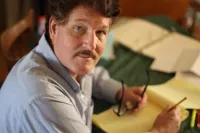"The Society that separates its Scholars from its Warriors, will have its thinking done by cowards and its fighting done by fools." Thucydides

PURPOSE: Become the Scholar Warrior for your Goals
Improve Every Single Day!
Improve Yourself 1% a Day = 3600%+ in a Year
Thought-Technique-Strategy of the Week:
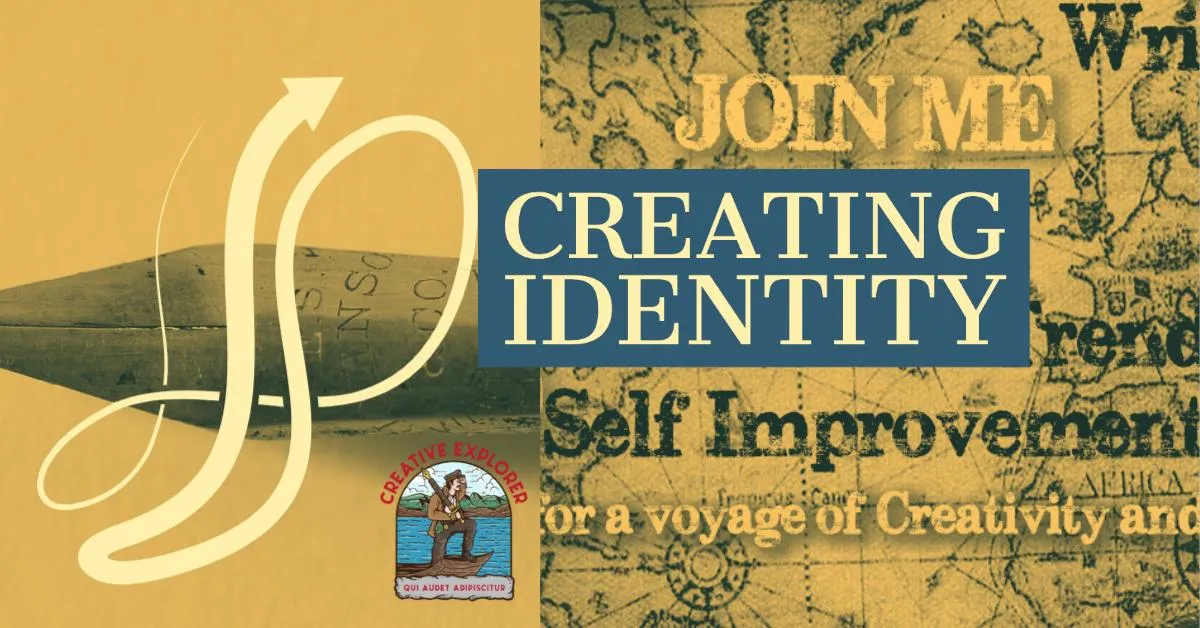
Create Your Powerful Identity
Let's say you wish to excel in the art of painting. Or open your own woodworking business. Or become a Filmmaker which I did many years ago. The key is to utilize a Powerful Identity in reframing your Focus. Let's stick with painter for the moment.
Use the words: "I am a painter." The powerful use of the "I am..." phrase welds this new outlook to you mentally, intellectually but, more importantly, emotionally. Why emotionally? When you talk about painting (or any very exciting goal), then you can feel the electrical excitement within your body and Being.
"Being" is the act of existing within this newly embraced identity. Then you grow and become.
READ THE MAIN ARTICLE HERE
7 Actions To Change Your Life
Michael's Kenpo Karate Weapons Form - Knife & Pistol
You can see my Pistol & Knife form at approximately 10:31 here in the video from 2010. This is at Bryan Hawkins Kenpo Karate where I have studied Kenpo Karate for approximately over 35 years. The form is one that I created to advance in the system, utilizing Kenpo Karate principles. I use the form with the primary weapon as the firearm, duly guarded and using the knife for close-in drills. This is the training the Warrior phase!
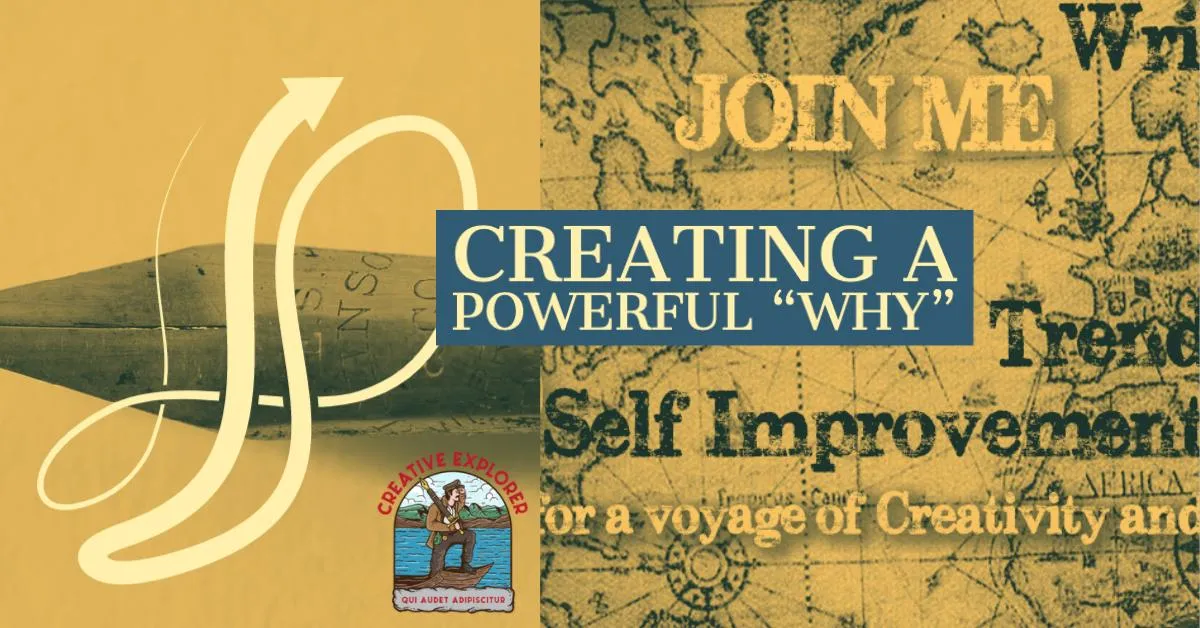



Creating the Scholar Warrior Identity: Tony Curtis
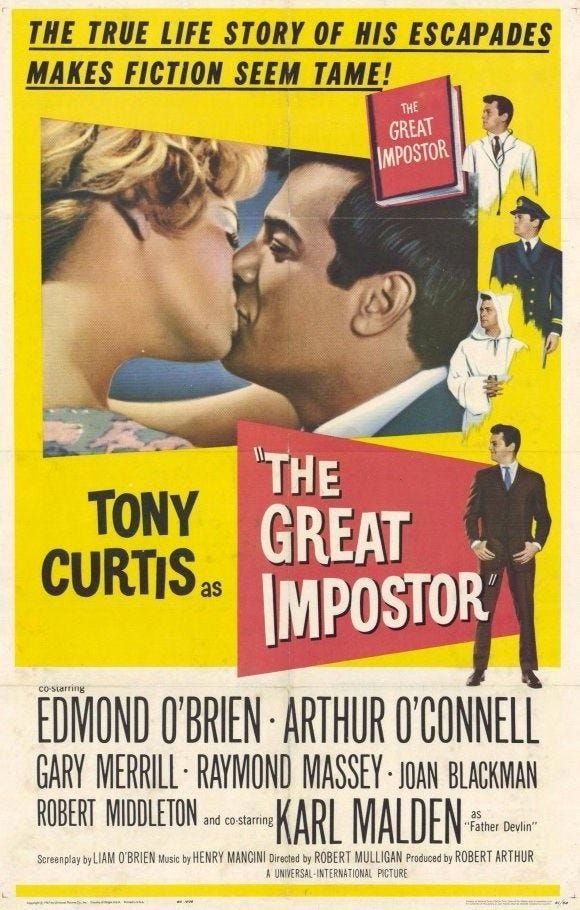
I know that films are extremely powerful cultural touchstones because I grew up with the cinema as my sanctuary. I simply loved movies and wanted to make them no matter what. Someway, somehow, someday, I was going to be in the film industry. The dark hallowed theater was a religious experience where the lights went off and the imagination fired up.
The Movies were a Time Machine, a Transporter and an Imagination Generator.
How and What could I learn from movies? What philosophies can I garner from movies?
If you wonder how you can create your own new Identity as a Scholar Warrior, then you should realize that this identity is an ‘umbrella’ identity under which other identities can be created or set. By example, check out this film with Tony Curtis. If he can create numerous identities, then so can you. Maybe not in such a crazy adventure manner, but in a constructive purposeful life. Nonetheless, the check out the film.
THE GREAT IMPOSTER BECOMES THE PERSON
The film "The Great Imposter" is about a man, Ferdinand Waldo Demara, who embraced numerous identities and positions in his life. Demara was called "The Great Imposter" with his photographic memory in assuming roles inside the power vacuum of institutions. According to Wikipedia, his roles include...
According to Wikipedia,
Demara's impersonations included a naval surgeon,a civil engineer, a sheriff's deputy, an assistant prison warden, a doctor of applied psychology, a hospital orderly, a lawyer, a child-care expert, a Benedictine monk, a Trappist monk, an editor, a cancer researcher, and a teacher. One teaching job led to six months in prison.
With Tony Curtis in the starring role - which Curtis said was his favorite role - I fondly remember the film from childhood. After all, who wouldn't want to have all these great identities and experiences?
A fascinating story.
The Great Impostor is a 1961 American comedy-drama film movie based on the true story of an impostor named Ferdinand Waldo Demara. The film is loosely based on Robert Crichton's 1959 biography of the same name, it stars Tony Curtis in the title role, and was directed by Robert Mulligan. The film only loosely follows Demara's real-life exploits, and is much lighter in tone than the book on which it is based.
Spoilers!!
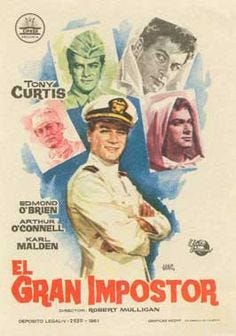
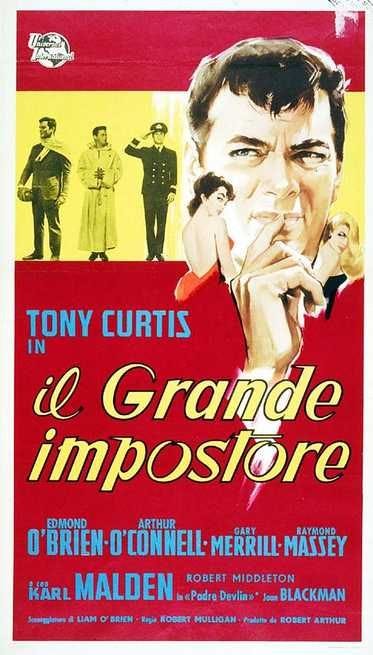
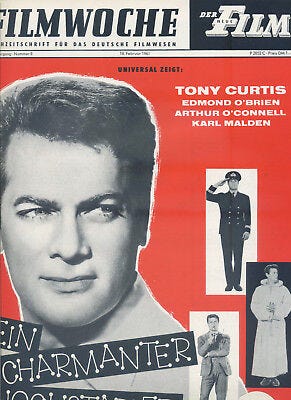
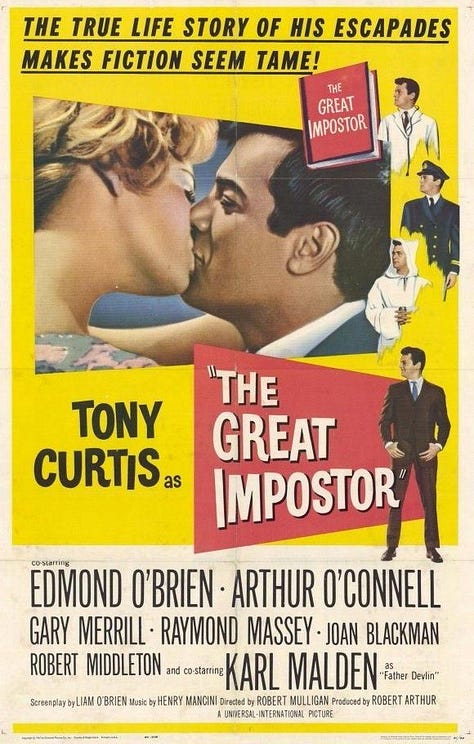
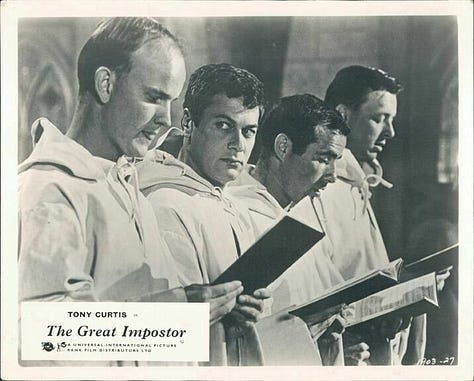
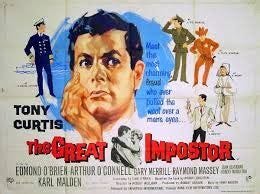
Plot - “The Great Imposter”
As he is arrested by the Coast Guard on an island in New England, a man born as Ferdinand Waldo Demara but known by many other identities recalls the events that brought him to this point.
Demara quit high school as a boy and joined the Army. He wanted to become an officer, but his lack of education worked against it. On a whim, he fakes a set of credentials and becomes a U.S. Marine.
When his lie is detected, Demara, facing jail, fakes a suicide and hides out as a Trappist monk. After a while, he is expelled from the monastery, captured and imprisoned in a military brig. But the warden inadvertently confides too many details of his own life to Demara, taking a liking to him. Upon his release, Demara impersonates the warden and lands a job working in a Texas penitentiary, where he takes up with his new warden's daughter, Eulalie.
Blackmailed by an inmate who recognizes him from the military jail, Demara once again flees. He joins the Royal Canadian Navy, using the forged credentials of a doctor. After falling in love with a RCN Nursing Sister, Catherine Lacey, he goes to Korea to serve aboard HMCS Cayuga. He ends up doing dental work on the ship's captain, then performing operations in a Korean hospital.
Hailed as a "miracle doctor," Demara gains publicity that exposes his past. The Navy finds out who he really is and intends to hold a court-martial. Nurse Lacey and others vow to testify on Demara's behalf, having seen his good side. Worried about possible disrepute to the RCN, and his stellar service, he is allowed to leave under a general discharge. He then goes and becomes a teacher in New England.
The FBI eventually comes up with an agent whose assignment is to track down the great impostor and capture him. In the end, the agent is revealed to be Demara himself.
The Full Feature on Archive.org
https://archive.org/details/TheGreatImpostorTonyCurtisClassicFilm

Creating the Scholar Warrior Identity: Tony Curtis

I know that films are extremely powerful cultural touchstones because I grew up with the cinema as my sanctuary. I simply loved movies and wanted to make them no matter what. Someway, somehow, someday, I was going to be in the film industry. The dark hallowed theater was a religious experience where the lights went off and the imagination fired up.
The Movies were a Time Machine, a Transporter and an Imagination Generator.
How and What could I learn from movies? What philosophies can I garner from movies?
If you wonder how you can create your own new Identity as a Scholar Warrior, then you should realize that this identity is an ‘umbrella’ identity under which other identities can be created or set. By example, check out this film with Tony Curtis. If he can create numerous identities, then so can you. Maybe not in such a crazy adventure manner, but in a constructive purposeful life. Nonetheless, the check out the film.
THE GREAT IMPOSTER BECOMES THE PERSON
The film "The Great Imposter" is about a man, Ferdinand Waldo Demara, who embraced numerous identities and positions in his life. Demara was called "The Great Imposter" with his photographic memory in assuming roles inside the power vacuum of institutions. According to Wikipedia, his roles include...
According to Wikipedia,
Demara's impersonations included a naval surgeon,a civil engineer, a sheriff's deputy, an assistant prison warden, a doctor of applied psychology, a hospital orderly, a lawyer, a child-care expert, a Benedictine monk, a Trappist monk, an editor, a cancer researcher, and a teacher. One teaching job led to six months in prison.
With Tony Curtis in the starring role - which Curtis said was his favorite role - I fondly remember the film from childhood. After all, who wouldn't want to have all these great identities and experiences?
A fascinating story.
The Great Impostor is a 1961 American comedy-drama film movie based on the true story of an impostor named Ferdinand Waldo Demara. The film is loosely based on Robert Crichton's 1959 biography of the same name, it stars Tony Curtis in the title role, and was directed by Robert Mulligan. The film only loosely follows Demara's real-life exploits, and is much lighter in tone than the book on which it is based.
Spoilers!!






Plot - “The Great Imposter”
As he is arrested by the Coast Guard on an island in New England, a man born as Ferdinand Waldo Demara but known by many other identities recalls the events that brought him to this point.
Demara quit high school as a boy and joined the Army. He wanted to become an officer, but his lack of education worked against it. On a whim, he fakes a set of credentials and becomes a U.S. Marine.
When his lie is detected, Demara, facing jail, fakes a suicide and hides out as a Trappist monk. After a while, he is expelled from the monastery, captured and imprisoned in a military brig. But the warden inadvertently confides too many details of his own life to Demara, taking a liking to him. Upon his release, Demara impersonates the warden and lands a job working in a Texas penitentiary, where he takes up with his new warden's daughter, Eulalie.
Blackmailed by an inmate who recognizes him from the military jail, Demara once again flees. He joins the Royal Canadian Navy, using the forged credentials of a doctor. After falling in love with a RCN Nursing Sister, Catherine Lacey, he goes to Korea to serve aboard HMCS Cayuga. He ends up doing dental work on the ship's captain, then performing operations in a Korean hospital.
Hailed as a "miracle doctor," Demara gains publicity that exposes his past. The Navy finds out who he really is and intends to hold a court-martial. Nurse Lacey and others vow to testify on Demara's behalf, having seen his good side. Worried about possible disrepute to the RCN, and his stellar service, he is allowed to leave under a general discharge. He then goes and becomes a teacher in New England.
The FBI eventually comes up with an agent whose assignment is to track down the great impostor and capture him. In the end, the agent is revealed to be Demara himself.
The Full Feature on Archive.org
https://archive.org/details/TheGreatImpostorTonyCurtisClassicFilm

Creating the Scholar Warrior Identity: Tony Curtis

I know that films are extremely powerful cultural touchstones because I grew up with the cinema as my sanctuary. I simply loved movies and wanted to make them no matter what. Someway, somehow, someday, I was going to be in the film industry. The dark hallowed theater was a religious experience where the lights went off and the imagination fired up.
The Movies were a Time Machine, a Transporter and an Imagination Generator.
How and What could I learn from movies? What philosophies can I garner from movies?
If you wonder how you can create your own new Identity as a Scholar Warrior, then you should realize that this identity is an ‘umbrella’ identity under which other identities can be created or set. By example, check out this film with Tony Curtis. If he can create numerous identities, then so can you. Maybe not in such a crazy adventure manner, but in a constructive purposeful life. Nonetheless, the check out the film.
THE GREAT IMPOSTER BECOMES THE PERSON
The film "The Great Imposter" is about a man, Ferdinand Waldo Demara, who embraced numerous identities and positions in his life. Demara was called "The Great Imposter" with his photographic memory in assuming roles inside the power vacuum of institutions. According to Wikipedia, his roles include...
According to Wikipedia,
Demara's impersonations included a naval surgeon,a civil engineer, a sheriff's deputy, an assistant prison warden, a doctor of applied psychology, a hospital orderly, a lawyer, a child-care expert, a Benedictine monk, a Trappist monk, an editor, a cancer researcher, and a teacher. One teaching job led to six months in prison.
With Tony Curtis in the starring role - which Curtis said was his favorite role - I fondly remember the film from childhood. After all, who wouldn't want to have all these great identities and experiences?
A fascinating story.
The Great Impostor is a 1961 American comedy-drama film movie based on the true story of an impostor named Ferdinand Waldo Demara. The film is loosely based on Robert Crichton's 1959 biography of the same name, it stars Tony Curtis in the title role, and was directed by Robert Mulligan. The film only loosely follows Demara's real-life exploits, and is much lighter in tone than the book on which it is based.
Spoilers!!






Plot - “The Great Imposter”
As he is arrested by the Coast Guard on an island in New England, a man born as Ferdinand Waldo Demara but known by many other identities recalls the events that brought him to this point.
Demara quit high school as a boy and joined the Army. He wanted to become an officer, but his lack of education worked against it. On a whim, he fakes a set of credentials and becomes a U.S. Marine.
When his lie is detected, Demara, facing jail, fakes a suicide and hides out as a Trappist monk. After a while, he is expelled from the monastery, captured and imprisoned in a military brig. But the warden inadvertently confides too many details of his own life to Demara, taking a liking to him. Upon his release, Demara impersonates the warden and lands a job working in a Texas penitentiary, where he takes up with his new warden's daughter, Eulalie.
Blackmailed by an inmate who recognizes him from the military jail, Demara once again flees. He joins the Royal Canadian Navy, using the forged credentials of a doctor. After falling in love with a RCN Nursing Sister, Catherine Lacey, he goes to Korea to serve aboard HMCS Cayuga. He ends up doing dental work on the ship's captain, then performing operations in a Korean hospital.
Hailed as a "miracle doctor," Demara gains publicity that exposes his past. The Navy finds out who he really is and intends to hold a court-martial. Nurse Lacey and others vow to testify on Demara's behalf, having seen his good side. Worried about possible disrepute to the RCN, and his stellar service, he is allowed to leave under a general discharge. He then goes and becomes a teacher in New England.
The FBI eventually comes up with an agent whose assignment is to track down the great impostor and capture him. In the end, the agent is revealed to be Demara himself.
The Full Feature on Archive.org
https://archive.org/details/TheGreatImpostorTonyCurtisClassicFilm

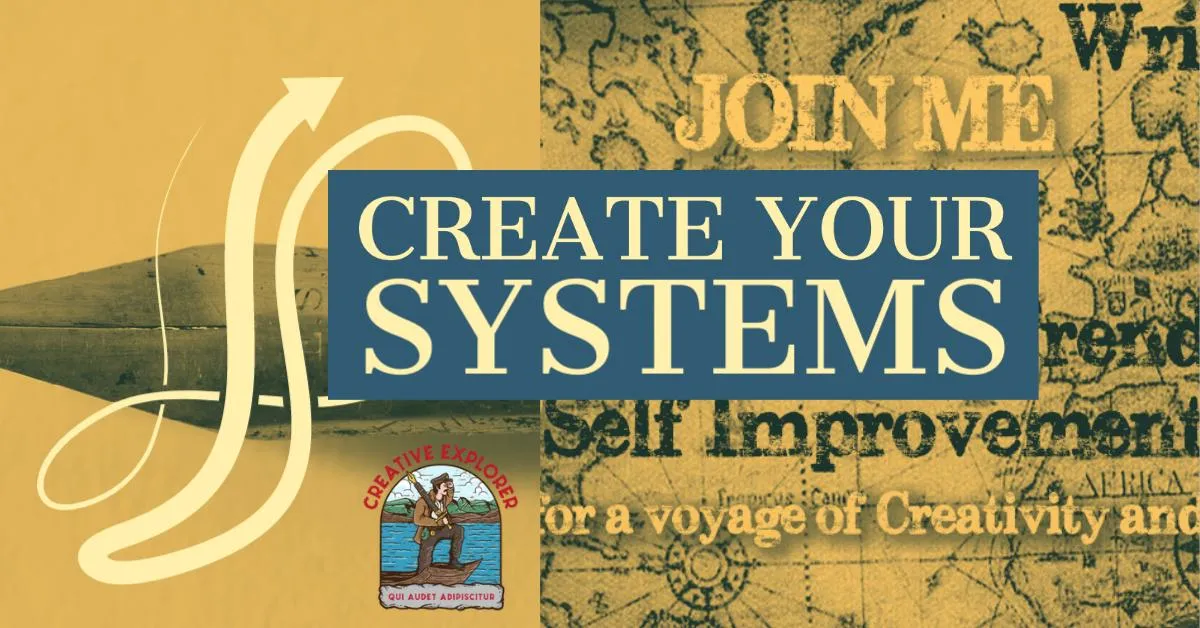
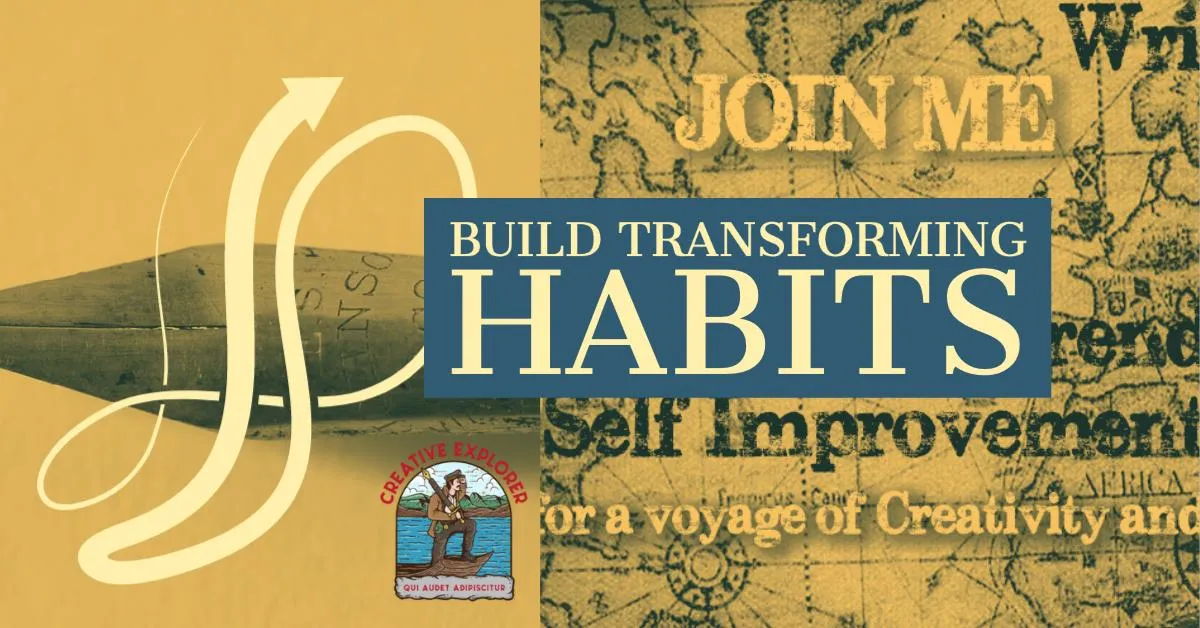


Creating the Scholar Warrior Identity: Tony Curtis

I know that films are extremely powerful cultural touchstones because I grew up with the cinema as my sanctuary. I simply loved movies and wanted to make them no matter what. Someway, somehow, someday, I was going to be in the film industry. The dark hallowed theater was a religious experience where the lights went off and the imagination fired up.
The Movies were a Time Machine, a Transporter and an Imagination Generator.
How and What could I learn from movies? What philosophies can I garner from movies?
If you wonder how you can create your own new Identity as a Scholar Warrior, then you should realize that this identity is an ‘umbrella’ identity under which other identities can be created or set. By example, check out this film with Tony Curtis. If he can create numerous identities, then so can you. Maybe not in such a crazy adventure manner, but in a constructive purposeful life. Nonetheless, the check out the film.
THE GREAT IMPOSTER BECOMES THE PERSON
The film "The Great Imposter" is about a man, Ferdinand Waldo Demara, who embraced numerous identities and positions in his life. Demara was called "The Great Imposter" with his photographic memory in assuming roles inside the power vacuum of institutions. According to Wikipedia, his roles include...
According to Wikipedia,
Demara's impersonations included a naval surgeon,a civil engineer, a sheriff's deputy, an assistant prison warden, a doctor of applied psychology, a hospital orderly, a lawyer, a child-care expert, a Benedictine monk, a Trappist monk, an editor, a cancer researcher, and a teacher. One teaching job led to six months in prison.
With Tony Curtis in the starring role - which Curtis said was his favorite role - I fondly remember the film from childhood. After all, who wouldn't want to have all these great identities and experiences?
A fascinating story.
The Great Impostor is a 1961 American comedy-drama film movie based on the true story of an impostor named Ferdinand Waldo Demara. The film is loosely based on Robert Crichton's 1959 biography of the same name, it stars Tony Curtis in the title role, and was directed by Robert Mulligan. The film only loosely follows Demara's real-life exploits, and is much lighter in tone than the book on which it is based.
Spoilers!!






Plot - “The Great Imposter”
As he is arrested by the Coast Guard on an island in New England, a man born as Ferdinand Waldo Demara but known by many other identities recalls the events that brought him to this point.
Demara quit high school as a boy and joined the Army. He wanted to become an officer, but his lack of education worked against it. On a whim, he fakes a set of credentials and becomes a U.S. Marine.
When his lie is detected, Demara, facing jail, fakes a suicide and hides out as a Trappist monk. After a while, he is expelled from the monastery, captured and imprisoned in a military brig. But the warden inadvertently confides too many details of his own life to Demara, taking a liking to him. Upon his release, Demara impersonates the warden and lands a job working in a Texas penitentiary, where he takes up with his new warden's daughter, Eulalie.
Blackmailed by an inmate who recognizes him from the military jail, Demara once again flees. He joins the Royal Canadian Navy, using the forged credentials of a doctor. After falling in love with a RCN Nursing Sister, Catherine Lacey, he goes to Korea to serve aboard HMCS Cayuga. He ends up doing dental work on the ship's captain, then performing operations in a Korean hospital.
Hailed as a "miracle doctor," Demara gains publicity that exposes his past. The Navy finds out who he really is and intends to hold a court-martial. Nurse Lacey and others vow to testify on Demara's behalf, having seen his good side. Worried about possible disrepute to the RCN, and his stellar service, he is allowed to leave under a general discharge. He then goes and becomes a teacher in New England.
The FBI eventually comes up with an agent whose assignment is to track down the great impostor and capture him. In the end, the agent is revealed to be Demara himself.
The Full Feature on Archive.org
https://archive.org/details/TheGreatImpostorTonyCurtisClassicFilm

Creating the Scholar Warrior Identity: Tony Curtis

I know that films are extremely powerful cultural touchstones because I grew up with the cinema as my sanctuary. I simply loved movies and wanted to make them no matter what. Someway, somehow, someday, I was going to be in the film industry. The dark hallowed theater was a religious experience where the lights went off and the imagination fired up.
The Movies were a Time Machine, a Transporter and an Imagination Generator.
How and What could I learn from movies? What philosophies can I garner from movies?
If you wonder how you can create your own new Identity as a Scholar Warrior, then you should realize that this identity is an ‘umbrella’ identity under which other identities can be created or set. By example, check out this film with Tony Curtis. If he can create numerous identities, then so can you. Maybe not in such a crazy adventure manner, but in a constructive purposeful life. Nonetheless, the check out the film.
THE GREAT IMPOSTER BECOMES THE PERSON
The film "The Great Imposter" is about a man, Ferdinand Waldo Demara, who embraced numerous identities and positions in his life. Demara was called "The Great Imposter" with his photographic memory in assuming roles inside the power vacuum of institutions. According to Wikipedia, his roles include...
According to Wikipedia,
Demara's impersonations included a naval surgeon,a civil engineer, a sheriff's deputy, an assistant prison warden, a doctor of applied psychology, a hospital orderly, a lawyer, a child-care expert, a Benedictine monk, a Trappist monk, an editor, a cancer researcher, and a teacher. One teaching job led to six months in prison.
With Tony Curtis in the starring role - which Curtis said was his favorite role - I fondly remember the film from childhood. After all, who wouldn't want to have all these great identities and experiences?
A fascinating story.
The Great Impostor is a 1961 American comedy-drama film movie based on the true story of an impostor named Ferdinand Waldo Demara. The film is loosely based on Robert Crichton's 1959 biography of the same name, it stars Tony Curtis in the title role, and was directed by Robert Mulligan. The film only loosely follows Demara's real-life exploits, and is much lighter in tone than the book on which it is based.
Spoilers!!






Plot - “The Great Imposter”
As he is arrested by the Coast Guard on an island in New England, a man born as Ferdinand Waldo Demara but known by many other identities recalls the events that brought him to this point.
Demara quit high school as a boy and joined the Army. He wanted to become an officer, but his lack of education worked against it. On a whim, he fakes a set of credentials and becomes a U.S. Marine.
When his lie is detected, Demara, facing jail, fakes a suicide and hides out as a Trappist monk. After a while, he is expelled from the monastery, captured and imprisoned in a military brig. But the warden inadvertently confides too many details of his own life to Demara, taking a liking to him. Upon his release, Demara impersonates the warden and lands a job working in a Texas penitentiary, where he takes up with his new warden's daughter, Eulalie.
Blackmailed by an inmate who recognizes him from the military jail, Demara once again flees. He joins the Royal Canadian Navy, using the forged credentials of a doctor. After falling in love with a RCN Nursing Sister, Catherine Lacey, he goes to Korea to serve aboard HMCS Cayuga. He ends up doing dental work on the ship's captain, then performing operations in a Korean hospital.
Hailed as a "miracle doctor," Demara gains publicity that exposes his past. The Navy finds out who he really is and intends to hold a court-martial. Nurse Lacey and others vow to testify on Demara's behalf, having seen his good side. Worried about possible disrepute to the RCN, and his stellar service, he is allowed to leave under a general discharge. He then goes and becomes a teacher in New England.
The FBI eventually comes up with an agent whose assignment is to track down the great impostor and capture him. In the end, the agent is revealed to be Demara himself.
The Full Feature on Archive.org
https://archive.org/details/TheGreatImpostorTonyCurtisClassicFilm

Creating the Scholar Warrior Identity: Tony Curtis

I know that films are extremely powerful cultural touchstones because I grew up with the cinema as my sanctuary. I simply loved movies and wanted to make them no matter what. Someway, somehow, someday, I was going to be in the film industry. The dark hallowed theater was a religious experience where the lights went off and the imagination fired up.
The Movies were a Time Machine, a Transporter and an Imagination Generator.
How and What could I learn from movies? What philosophies can I garner from movies?
If you wonder how you can create your own new Identity as a Scholar Warrior, then you should realize that this identity is an ‘umbrella’ identity under which other identities can be created or set. By example, check out this film with Tony Curtis. If he can create numerous identities, then so can you. Maybe not in such a crazy adventure manner, but in a constructive purposeful life. Nonetheless, the check out the film.
THE GREAT IMPOSTER BECOMES THE PERSON
The film "The Great Imposter" is about a man, Ferdinand Waldo Demara, who embraced numerous identities and positions in his life. Demara was called "The Great Imposter" with his photographic memory in assuming roles inside the power vacuum of institutions. According to Wikipedia, his roles include...
According to Wikipedia,
Demara's impersonations included a naval surgeon,a civil engineer, a sheriff's deputy, an assistant prison warden, a doctor of applied psychology, a hospital orderly, a lawyer, a child-care expert, a Benedictine monk, a Trappist monk, an editor, a cancer researcher, and a teacher. One teaching job led to six months in prison.
With Tony Curtis in the starring role - which Curtis said was his favorite role - I fondly remember the film from childhood. After all, who wouldn't want to have all these great identities and experiences?
A fascinating story.
The Great Impostor is a 1961 American comedy-drama film movie based on the true story of an impostor named Ferdinand Waldo Demara. The film is loosely based on Robert Crichton's 1959 biography of the same name, it stars Tony Curtis in the title role, and was directed by Robert Mulligan. The film only loosely follows Demara's real-life exploits, and is much lighter in tone than the book on which it is based.
Spoilers!!






Plot - “The Great Imposter”
As he is arrested by the Coast Guard on an island in New England, a man born as Ferdinand Waldo Demara but known by many other identities recalls the events that brought him to this point.
Demara quit high school as a boy and joined the Army. He wanted to become an officer, but his lack of education worked against it. On a whim, he fakes a set of credentials and becomes a U.S. Marine.
When his lie is detected, Demara, facing jail, fakes a suicide and hides out as a Trappist monk. After a while, he is expelled from the monastery, captured and imprisoned in a military brig. But the warden inadvertently confides too many details of his own life to Demara, taking a liking to him. Upon his release, Demara impersonates the warden and lands a job working in a Texas penitentiary, where he takes up with his new warden's daughter, Eulalie.
Blackmailed by an inmate who recognizes him from the military jail, Demara once again flees. He joins the Royal Canadian Navy, using the forged credentials of a doctor. After falling in love with a RCN Nursing Sister, Catherine Lacey, he goes to Korea to serve aboard HMCS Cayuga. He ends up doing dental work on the ship's captain, then performing operations in a Korean hospital.
Hailed as a "miracle doctor," Demara gains publicity that exposes his past. The Navy finds out who he really is and intends to hold a court-martial. Nurse Lacey and others vow to testify on Demara's behalf, having seen his good side. Worried about possible disrepute to the RCN, and his stellar service, he is allowed to leave under a general discharge. He then goes and becomes a teacher in New England.
The FBI eventually comes up with an agent whose assignment is to track down the great impostor and capture him. In the end, the agent is revealed to be Demara himself.
The Full Feature on Archive.org
https://archive.org/details/TheGreatImpostorTonyCurtisClassicFilm

Creating the Scholar Warrior Identity: Tony Curtis

I know that films are extremely powerful cultural touchstones because I grew up with the cinema as my sanctuary. I simply loved movies and wanted to make them no matter what. Someway, somehow, someday, I was going to be in the film industry. The dark hallowed theater was a religious experience where the lights went off and the imagination fired up.
The Movies were a Time Machine, a Transporter and an Imagination Generator.
How and What could I learn from movies? What philosophies can I garner from movies?
If you wonder how you can create your own new Identity as a Scholar Warrior, then you should realize that this identity is an ‘umbrella’ identity under which other identities can be created or set. By example, check out this film with Tony Curtis. If he can create numerous identities, then so can you. Maybe not in such a crazy adventure manner, but in a constructive purposeful life. Nonetheless, the check out the film.
THE GREAT IMPOSTER BECOMES THE PERSON
The film "The Great Imposter" is about a man, Ferdinand Waldo Demara, who embraced numerous identities and positions in his life. Demara was called "The Great Imposter" with his photographic memory in assuming roles inside the power vacuum of institutions. According to Wikipedia, his roles include...
According to Wikipedia,
Demara's impersonations included a naval surgeon,a civil engineer, a sheriff's deputy, an assistant prison warden, a doctor of applied psychology, a hospital orderly, a lawyer, a child-care expert, a Benedictine monk, a Trappist monk, an editor, a cancer researcher, and a teacher. One teaching job led to six months in prison.
With Tony Curtis in the starring role - which Curtis said was his favorite role - I fondly remember the film from childhood. After all, who wouldn't want to have all these great identities and experiences?
A fascinating story.
The Great Impostor is a 1961 American comedy-drama film movie based on the true story of an impostor named Ferdinand Waldo Demara. The film is loosely based on Robert Crichton's 1959 biography of the same name, it stars Tony Curtis in the title role, and was directed by Robert Mulligan. The film only loosely follows Demara's real-life exploits, and is much lighter in tone than the book on which it is based.
Spoilers!!






Plot - “The Great Imposter”
As he is arrested by the Coast Guard on an island in New England, a man born as Ferdinand Waldo Demara but known by many other identities recalls the events that brought him to this point.
Demara quit high school as a boy and joined the Army. He wanted to become an officer, but his lack of education worked against it. On a whim, he fakes a set of credentials and becomes a U.S. Marine.
When his lie is detected, Demara, facing jail, fakes a suicide and hides out as a Trappist monk. After a while, he is expelled from the monastery, captured and imprisoned in a military brig. But the warden inadvertently confides too many details of his own life to Demara, taking a liking to him. Upon his release, Demara impersonates the warden and lands a job working in a Texas penitentiary, where he takes up with his new warden's daughter, Eulalie.
Blackmailed by an inmate who recognizes him from the military jail, Demara once again flees. He joins the Royal Canadian Navy, using the forged credentials of a doctor. After falling in love with a RCN Nursing Sister, Catherine Lacey, he goes to Korea to serve aboard HMCS Cayuga. He ends up doing dental work on the ship's captain, then performing operations in a Korean hospital.
Hailed as a "miracle doctor," Demara gains publicity that exposes his past. The Navy finds out who he really is and intends to hold a court-martial. Nurse Lacey and others vow to testify on Demara's behalf, having seen his good side. Worried about possible disrepute to the RCN, and his stellar service, he is allowed to leave under a general discharge. He then goes and becomes a teacher in New England.
The FBI eventually comes up with an agent whose assignment is to track down the great impostor and capture him. In the end, the agent is revealed to be Demara himself.
The Full Feature on Archive.org
https://archive.org/details/TheGreatImpostorTonyCurtisClassicFilm
Take Action Today!
SCHOLAR WARRIOR WAY - COURSES

Scholar Warrior Way
Take Action to Transform Yourself
By taking the Scholar Warrior Way Course, you will get Michael's program for Self-Improvement in his pursuit of Creative Excellence in Writing, Filmmaking, Martial arts and his other pursuits from his major curious outlook. Here are the 7 Steps that he uses....
Powerful Why - the Key to Enthusiasm and Fulfillment
Scholar Warrior Identity - Embracing the new Mentality - now!
Your Morning Routine - Starting the day Right.
Brainstorming Your How - Strategy thinking and tactics
Create Your Own Systems - Become efficient with predictable results
Building Transforming Habits - Habit creates Destiny
The Art of Sleep - Long ignored but a necessary health break.
Levels 1, 2 and 3 - Detailing and add more videos, wisdom, resources and Learning Materials for your Growth and Self-Improvement.
FAQS
What is The Purpose of the "ScholarWarriorWay" ?
By engaging in the mental perspective of the Scholar Warrior, you embrace two aspects of your life: The Scholar with a constant focus on self-development and self-improvement. The Warrior whereby you learn techniques about courage, action and derring-do to achieve your true authentic goals for a fulfilled life.
How much does Scholar Warrior Way cost?
The cost of could be absolutely no money if you just want to get on our newsletter to read the various articles on the website. If you want to take the courses on various levels, then you might spend $200-300 per year. Think of it this way: If you could improve yourself 100-200-300-1000-3600% in a single year, then how much is it worth? The price of two meals and drinks at a restaurant that you'll never remember? Make a better life choice.
How do I know I work with the ScholarWarriorWay?
ScholarWarriorWay is broken down into 7 Major Strategies. You can pick one and work on it for a few weeks, then add another strategies. They start with the Powerful Why and end with the Art of Sleep.

